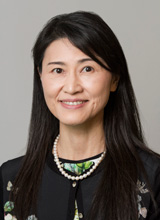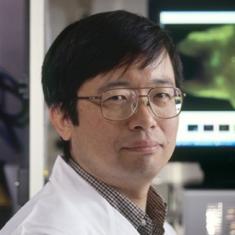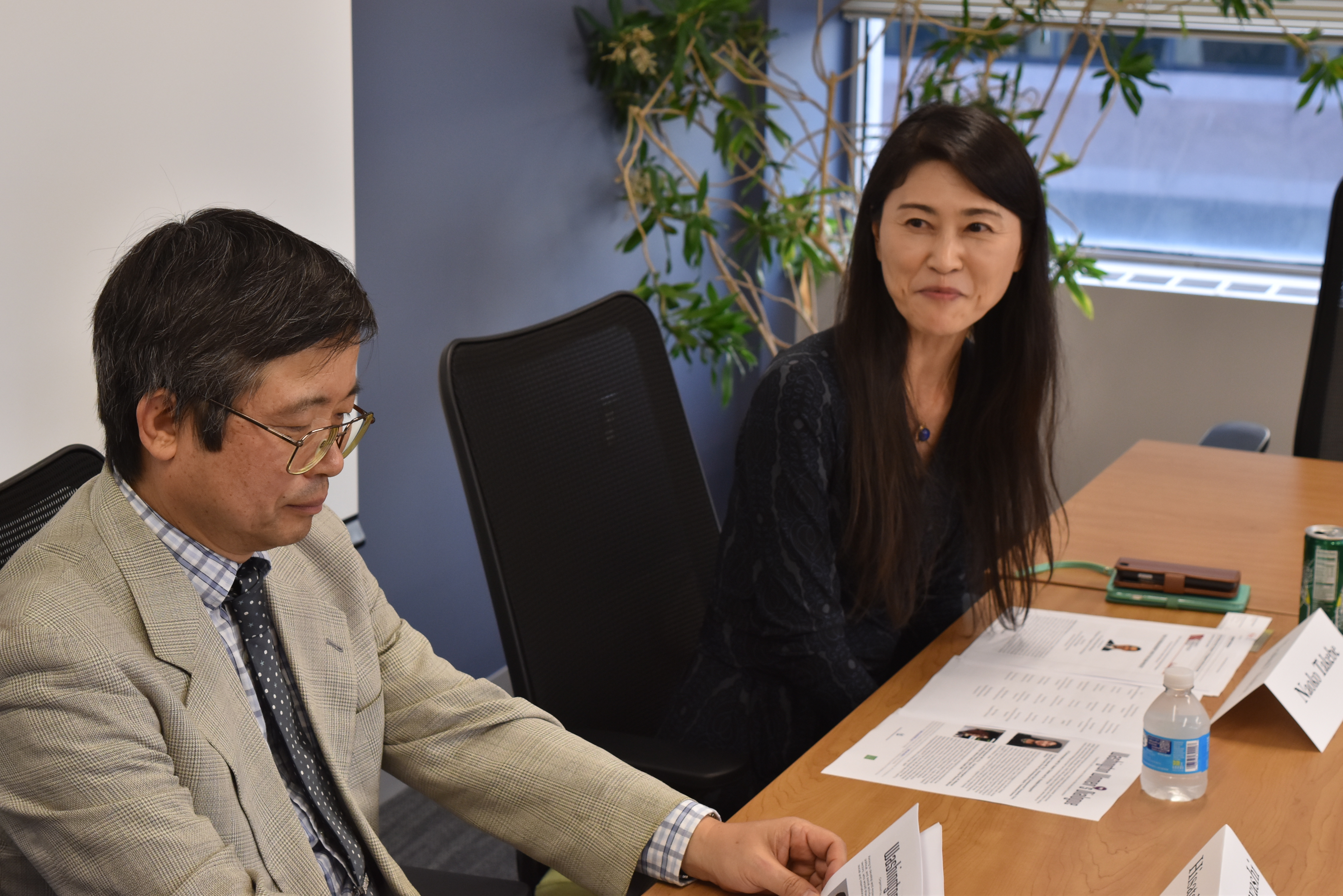
X

There are numerous social challenges to overcome in order to achieve a society where women can actively and inclusively participate in. To achieve this goal, JSIE was founded particularly in order to develop and expand Asian women’s presence in global leadership roles in business, government, political, and social activities. It holds “Washington Women’s Dialogue” (WWD), co-hosted by the Maureen and Mike Mansfield Foundation, featuring prominent role models in various sectors, who share their life experience. WWD offers opportunities to frankly discuss various issues on social and international challenges and learn how to overcome such challenges.
At the 11th WWD, we welcomed Dr. Naoko Takebe and Dr. Hisataka Kobayashi, who are conducting cutting-edge medical research at National Cancer Institute of National Institute of Health (NIH) and both successful in establishing own career. Both are active in the front line of cancer research, Dr. Kobayashi and his group developed groundbreaking methods to kill cancer cells, by developing targeted activatable optical agents and instruments/cameras to assist physicians for detecting invisible small cancer lesions during endoscopic/surgical procedures. His research is also known for what President Obama took up in the 2012 State of the Union Address. Dr. Takebe serves as Associate Chief of Developmental Therapeutics Clinic, and Head of the Early Clinical Trials Development Program at National Cancer Institute of NIH. Dr. Takebe’s work, contrasted with Dr. Kobayashi, focuses on more clinical aspects and design of clinical trial for advanced cancer therapy. They enthusiastically shared with us their life stories and paths to establish their own career and research.

Dr. Naoko Takebe MD, Ph.D. Associate Chief, Developmental Therapeutics Clinic; Head of the Early Clinical Trials Development Program, Translational Science Section
Dr. Takebe joined the Developmental Therapeutics Clinic as an Associate Chief, Translational Science Section, Head of the Early Clinical Trials Development Program in June 2017. Prior to her current position, she was a Senior Investigator at the Cancer Therapy Evaluation Program (CTEP) for nearly 10 years. At CTEP, she implemented early clinical trials under CRADA with pharmaceutical and bio-venture companies. Prior to joining NCI, she was a faculty member in the Department of Medicine and Department of Pathology at the University of Maryland School of Medicine, Blood and Stem Cell Transplant Program in the Division of Hematology/Oncology. As a physician scientist, she conducted clinical trials in the field of hematologic malignancies and stem cell transplantation. She also worked as a laboratory principal investigator (PI) investigating experimental therapeutics for multiple myeloma and using umbilical cord blood stem cell ex vivo expansion for allo-BMT. Dr. Takebe received her M.D. and Ph.D. degrees from Hirosaki University School of Medicine, Japan, and completed her medical Hematology/Oncology Fellowship at Memorial Sloan-Kettering Cancer Center in 1997, and a Postdoctoral Research Fellowship at the Memorial Sloan-Kettering Institute in 1999 focusing on gene therapy and molecular pharmacology and therapeutics. Currently, she is also a translational science PI for the NCI Exceptional Responder Initiative, and a NCI co-investigator for NCI-MATCH and Pediatric MATCH. She serves as an Associate Editor for “Current Problems in Cancer” from Elsevier. She also is a member of the NCI Provocative Question team and Cancer Moonshot Initiatives, Human Tumor Atlas. She serves as an oversea member for the Immunotherapy Guidance Working Group in Japan. She is board certified in Hematology and Medical Oncology.

Dr. Hisataka Kobayashi MD, Ph.D. Chief (Senior Investigator), Lab. Molecular Theranostic, Molecular Imaging Program, Center for Cancer Research, National Cancer Institute, National Institute of Health (NIH)
Dr. Kobayashi is a trained diagnostic radiologist focusing on the development of new imaging and theranostic probes for cancer. He has been working on developing new imaging/therapy agents and devices throughout his research career. His work is currently focused on optical, radionuclide and MR imaging methods. A major arm of his research is in the development and clinical translation of new technologies for molecular target-specific diagnosis/therapy of cancer based on his strong multi-disciplinary background especially in chemistry. His group developed targeted activatable optical agents and instruments/cameras to assist physicians for detecting invisible small cancer lesions during endoscopic/surgical procedures. His group also has developed antibody targeted photosensitizers to selectively treat cancer cells with light and named near infrared photoimmunotherapy (NIR-PIT). Using a variety of antibody-photosensitizer conjugates (APCs), his group has shown dramatic, rapid cell necrotic cell death upon the application of NIR light which can penetrate deep into the body. This adds safety because the necrosis is limited to cells that bind the antibody and to those cells exposed to NIR light leaving adjacent normal ones untouched. This group has also shown that PIT results in preservation of the tumor vasculature so that after NIR-PIT, there is a dramatic increase in the flow and permeability of tumor vessels allowing the deposition of up to 25x normal concentration of nano-sized agents including anti-cancer drugs such as Doxcil and Abraxane. Dr. Kobayashi is leading to translating selective agents among numerous agents which his group developed, such as indocyanine green (ICG) labeled full and small antibodies against prostate specific membrane antigen (PSMA) for assisting prostate cancer surgery, a gamma glutamyltransferase activatable sprayable optical imaging probe for detecting wide variety of cancers during surgical and endoscopic procedures, and PIT with several APCs based on humanized antibodies for head and neck, pancreas, lung, and colon cancers, into clinical patients to determine if they provide useful actionable information or function in patients with cancer. The first phase 1 trial of NIR-PIT against head and neck cancer has started from May 2015.
Dr. Hisataka Kobayashi has an M.D. and Ph.D. (Immunology/Medicine) from the Kyoto University, Kyoto, Japan. He has published over 250 scientific articles in clinical and preclinical bio-medical imaging over the last 20 years.








